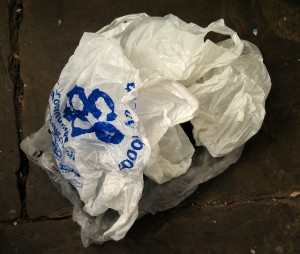
History of Plastic Carrier Bags
When plastic carrier bags were introduced to the retail environment in the late 1970s and early 1980s, they were heralded as a win-win for retailers and customers. They cost retailers far less than paper bags and were easier and convenient for consumers to carry. The plastic bag industry encouraged the consumers to ask for these bags by highlighting their convenience and versatility. By the 1990s, 80 percent of grocery bags were plastic, and by the 2000s, the share had risen to 90 percent.
Environmental Damage of Plastic Carrier Bags

Few people, however, anticipated the environmental risks and damage that these carrier bags would carry. Unlike paper sacks, which are produced from a semi renewable resource, plastic carrier bags are produced from a non-renewable resource- oil. Paper sacks are also biodegradable, while plastic bags are typically permanent litter in our environment. At best, the consumer will turn the plastic bags in for recycling, but more often than not, they make their way into land fills, or worse, into water ways and other habitats, wreaking havoc on ecosystems. These plastic bags can smother fish and small wildlife, be ingested, block water flows, all killing or harming fish, animals and birds. In addition, these carrier bags litter the sides of roads, parks, paths, and neighbourhoods. In fact, less than one percent of the world’s plastic bags get recycled.
Positive Impact of 5p Charge
Following a call to action by the United Nations, the United Kingdom is joining a number of other cities and countries around the world in applying a charge to the use of plastic bags, providing an economic incentive for consumers to make the environmentally responsible choice. Consumers are encouraged to either reuse their plastic carrier bags by bringing the sacks along every time they go shopping, or even better yet, develop the habit of using sustainable cloth “bags for life,” which are available for purchase and replacement at many shops. This shift from plastic carrier bags will have a large impact on the environment by reducing our demand for non-renewable resources, and by keeping non biodegradable plastic bags out of our neighbourhoods, ecosystems and landfills. In doing so, we will be saving countless animals’ lives, saving our natural resources, reducing the amount of waste disposal in landfills and preserving the earth’s beauty. Although the 5p charge on plastic bags may seem inconvenient, it is a small sacrifice for the sake of our planet and our environment.
If you are in need of mass disposal of carrier bags then Map Waste can provide a complete waste disposal solution for your business, we have a huge fleet of vehicles operating in and around the Leicestershire area, contact us today for a free quote.
